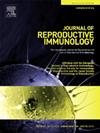静脉注射免疫球蛋白与安慰剂在复发性妊娠丢失:随机试验的系统回顾和荟萃分析
IF 2.9
3区 医学
Q3 IMMUNOLOGY
引用次数: 0
摘要
复发性妊娠丢失(RPL)影响1-2 %的有生育能力的夫妇,免疫因素越来越多地涉及不明原因的病例。目前,还没有令人信服的治疗方法。静脉注射免疫球蛋白(IVIg)是一种潜在的治疗方法,但结果并不一致。本研究评估IVIg是否会影响RPL妇女在随后妊娠中的活产率。我们检索了PubMed、Embase和Cochrane图书馆中截至2023年3月20日的相关随机对照试验,并联系了作者获取个体患者数据。包括两次或两次以上连续妊娠失败的妇女,在妊娠早期或妊娠早期接受IVIg或安慰剂的试验。主要结局是活产率和临床妊娠率,次要结局包括妊娠丢失率、副作用、不良事件和围产期结局。评估偏倚风险和证据确定性(GRADE)。纳入了涉及662名女性的10项研究。意向治疗分析显示,IVIg组和安慰剂组的活产率无显著差异(RR: 1.02, 95 % CI: 0.86-1.22, p = 0.78,GRADE:中度)。然而,每个方案分析显示IVIg增加了活产率(RR: 1.23, 95 % CI: 1.00-1.50, GRADE:低)。IVIg后的活产率随着既往丢失次数的增加而提高,特别是≥ 6次丢失的患者(RR: 5.26(1.58-17.53))。虽然IVIg治疗在总体活产率方面没有显示出显著的改善,但未来的研究应侧重于确定特定的患者亚组,例如那些有多次既往损失的患者,他们可能从这种治疗中获益最多。本文章由计算机程序翻译,如有差异,请以英文原文为准。
Intravenous immunoglobulin versus placebo in recurrent pregnancy loss: A systematic review and meta-analysis of randomized trials
Recurrent pregnancy loss (RPL) affects 1–2 % of fertile couples, with immunological factors increasingly implicated in unexplained cases. Currently, no convincing treatment exists. Intravenous immunoglobulin (IVIg) has been explored as a potential treatment, but results have been inconsistent. This study evaluates whether IVIg affects live birth rates in women with RPL in subsequent pregnancies. We searched PubMed, Embase, and Cochrane libraries for relevant randomized controlled trials up to March 20, 2023, and contacted authors for individual patient data. Trials involving women with two or more consecutive pregnancy losses who received IVIg or placebo before or during the first trimester were included. Primary outcomes were live birth and clinical pregnancy rates, with secondary outcomes including pregnancy loss rate, side effects, adverse events, and perinatal outcomes. Risk of bias and certainty of evidence (GRADE) were evaluated. Ten studies involving 662 women were included. The intention-to-treat analysis showed no significant difference in live birth rates between IVIg and placebo groups (RR: 1.02, 95 % CI: 0.86–1.22, p = 0.78, GRADE: moderate). However, per-protocol analysis indicated an increased live birth rate with IVIg (RR: 1.23, 95 % CI: 1.00–1.50, GRADE: low). Live birth rates after IVIg improved with the number of previous losses, especially in patients with ≥ 6 losses (RR: 5.26 (1.58–17.53)). While IVIg therapy did not show a significant improvement in live birth rates overall, future research should focus on identifying specific patient subgroups, such as those with multiple prior losses, who may benefit most from this treatment.
求助全文
通过发布文献求助,成功后即可免费获取论文全文。
去求助
来源期刊
CiteScore
6.30
自引率
5.90%
发文量
162
审稿时长
10.6 weeks
期刊介绍:
Affiliated with the European Society of Reproductive Immunology and with the International Society for Immunology of Reproduction
The aim of the Journal of Reproductive Immunology is to provide the critical forum for the dissemination of results from high quality research in all aspects of experimental, animal and clinical reproductive immunobiology.
This encompasses normal and pathological processes of:
* Male and Female Reproductive Tracts
* Gametogenesis and Embryogenesis
* Implantation and Placental Development
* Gestation and Parturition
* Mammary Gland and Lactation.

 求助内容:
求助内容: 应助结果提醒方式:
应助结果提醒方式:


